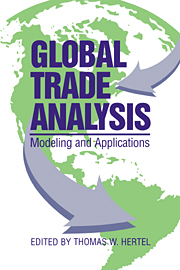Book contents
- Frontmatter
- Contents
- Acknowledgments
- List of contributors
- Foreword
- I Introduction and overview
- II Structure of GTAP framework
- III Applications of GTAP
- IV Evaluation of GTAP
- 14 Historical analysis of growth and trade patterns in the Pacific Rim: An evaluation of the GTAP framework
- 15 Implications for Global Trade Analysis
- Glossary of GTAP notation
- Index
15 - Implications for Global Trade Analysis
Published online by Cambridge University Press: 05 June 2012
- Frontmatter
- Contents
- Acknowledgments
- List of contributors
- Foreword
- I Introduction and overview
- II Structure of GTAP framework
- III Applications of GTAP
- IV Evaluation of GTAP
- 14 Historical analysis of growth and trade patterns in the Pacific Rim: An evaluation of the GTAP framework
- 15 Implications for Global Trade Analysis
- Glossary of GTAP notation
- Index
Summary
A decade ago, John Whalley (1986) assessed the state of play in applied general equilibrium (AGE) analysis and summarized his findings in a chapter entitled “Hidden Challenges in Recent Applied General Equilibrium Exercises.” At the time, he observed considerable frustration among AGE modelers with the seeming
necessity to be a jack of all trades. When involved in modelling activity in the applied general equilibrium area, one has to be familiar with general equilibrium theory, to be able to program, to be familiar with data and be able to manipulate and convert it into a model admissible form, to be conversant with literature estimates of key parameters, to have a clear sense of policy issues and institutional structure, and to be able to interpret results. When confronted with this range of activities, it is perhaps not surprising that it becomes difficult for graduate students and others to enter this area.” (pp. 38–39)
Although the advent of special purpose programming languages such as GAMS-MPS and GEMPACK have lessened the demands for programming skills, the other problems remain pertinent today. Indeed, with ever greater emphasis on global modeling, data problems have become only more severe.
Whalley goes on to discuss the value of teams of researchers, patterned after work in the natural sciences. This is the approach taken by the Impact Project, described in the foreword to this book.
- Type
- Chapter
- Information
- Global Trade AnalysisModeling and Applications, pp. 364 - 370Publisher: Cambridge University PressPrint publication year: 1996
- 75
- Cited by



